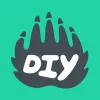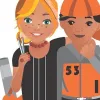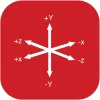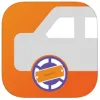Discover Inspiring Project Ideas and Tips
National Science Digital Library
Treasure trove of pre-K-12 science resources of varying quality
Bottom Line: An easy-to-use resource for expanding teachers' science and science-adjacent curriculum options for all ages.
Mystery Science

Big questions, kids' curiosity drive impressive science curriculum
Bottom Line: Powerful, quirky science units encourage inquiry and experimentation, inspiring students to ask and answer big questions.
Science Fair Central

Jam-packed resource site supports budding scientists' investigations
Bottom Line: Science Fair Central simplifies science fairs for students and teachers.
Project Noah

Engaging online community for relevant, hands-on science fieldwork
Bottom Line: Project Noah is a free and easy way to take part in biodiversity research with the support of a knowledgeable and global community.
Science Buddies

A magic wand for those seeking science project support and success
Bottom Line: Take the jitters out of science or engineering projects and fairs; this remarkable site coaches and supports students, parents, and teachers.
iNaturalist

Global citizen-science community for real-world research
Bottom Line: Teens can do hands-on nature research, but in a limited way.
Read Intriguing Science Research and News
Twig Science Reporter
Topical science news site offers sparse but high-quality resources
Bottom Line: It's an easy-to-recommend resource for adding timely science news stories and light science lessons to the classroom, but look elsewhere for depth.
California Academy of Sciences

Expert research and diverse, rich lessons inspire future scientists
Bottom Line: A perfect companion to (or substitute for) the Academy, this site delivers highly interactive resources and research with a lot of depth.
Science News for Students

Cool STEM articles with learning supports make for fun, informative reading
Bottom Line: Free, fascinating articles make science relevant to students.
Science Friday

A weekly dose of curiosity for teachers and students alike
Bottom Line: For a weekly rejuvenation of scientific learning, Science Friday is a source of inspiration for both teachers and students.
Frontiers for Young Minds

Kids and scientists collaborate to create high-quality articles
Bottom Line: A well-designed site that keeps kids in mind without sacrificing educational integrity.
bioGraphic
Awe-inspiring nature resource places importance on our planet's future
Bottom Line: For learning about how animals survive on a changing planet and about possible solutions to threatened ecosystems, bioGraphic is a stunning and informative place to start.
KQED Education
Excellent multimedia learning hub supports both teachers and students
Bottom Line: For those willing to dig around, the site is an exceptional place for both educators and students to find inspirational digital media resources.
NASA Global Climate Change - Vital Signs of the Planet

Tons of climate change info from expert sources in one easy place
Bottom Line: This is a one-stop shop for climate change info, from basic intro content to practical guides and raw data; good for middle schoolers and up.
NOVA
Compelling science videos have high-quality classroom applications
Bottom Line: Unparalleled science documentaries offer a window into real-world scientific topics in a high-interest way.
Explore Hands-On Projects and Experiments
howtosmile
Useful science resource aggregator promotes diverse lessons
Bottom Line: Despite a few broken links, the site's easy and well-organized access to thousands of quality science activities is a valuable teacher resource.
Jet Propulsion Laboratory

STEM lessons creatively build off of NASA data and real space missions
Bottom Line: These hands-on lessons approximate the work of NASA scientists, engineers, and astronauts and make use of actual NASA satellite data.
Design Squad Global
Fun engineering problems encourage classroom competition, innovation
Bottom Line: Design Squad Global makes learning STEAM concepts fun through hands-on activities and easy-to-understand scientific explanations.
DIY

Design, build, and share new things offline and online
Bottom Line: DIY motivates kids to tackle a wide range of problems with independent and scientific thinking.
Mosa Mack Science

Engaging design challenges turn kids into actual science detectives
Bottom Line: A thorough, engaging way to weave some engineering into your middle school science lessons.
KidsThinkDesign

Projects inspire creativity; a place for kids' sharing would boost fun
Bottom Line: A go-to site for teachers looking for well-presented project ideas; kids will need opportunities to share work locally.
Technovation Families
Family-focused site for learning AI well-suited to classrooms, too
Bottom Line: Makes artificial intelligence and machine learning accessible to students of many ages and abilities.
Exploratorium

Science experiments and activities abound in this comprehensive resource
Bottom Line: A host of mostly at-home activities are available if kids stick to the Explore tab of online resources.
Instructables

Endless collection of DIY projects; good for sharing and inspiration
Bottom Line: User-generated projects inspire sharing and learning, though more refined navigation would make it easier to sift through all the great ideas.
Make:

Fuel creative makers with project ideas, reviews, and community
Bottom Line: Excellent DIY resource that empowers kids to learn by making and experimenting.
Collect and Analyze Data for Experiments
LabCamera
Easy observation and measuring tool fun to use, has endless possibilities
Bottom Line: Using this science capturing and measuring tool is an easy, flexible way to expand your toolset and your science lesson options.
CODAP

Drag and drop data to investigate nearly any subject
Bottom Line: A bit awkward to use, but far more engaging than traditional spreadsheet/graphing tools.
Arduino Science Journal
Turn your phone into a lab sensor to collect and analyze data
Bottom Line: Science Journal does a good job recording real-time motion, sound, and light data using phones.
Lab4Physics

Bring physics to life using lab sensors built right into your smartphone
Bottom Line: Use your smartphone to gather data and study speed, gravity, waves, and other physics concepts.
VelocityLab

Turn anything with wheels into a handy motion sensor
Bottom Line: Pair your device with PocketLab sensors to gather position, velocity, and acceleration data on anything that rolls.
Data USA

Elegant treasure trove of data could fuel lessons and projects
Bottom Line: An efficient research tool that makes it easier to incorporate stats into a host of lessons or projects focusing on the U.S.







